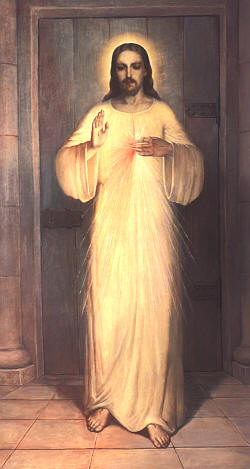Led forth in hope

Friday of Pascha
The Lord led forth his people in hope, alleluia:
and the sea overwhelmed their enemies,
alleluia, alleluia, alleluia (Ps 77: 53).
The Day Which the Lord Hath Made
We have arrived at the sixth day of the One Day that is Pascha, “the day which the Lord hath made” (Ps 117:24). We are also at the sixth in a series of eight magnificent Introits. Each of these expresses and, at the same time, impresses on the soul, a particular aspect of the Pasch of the Lord made present and communicated to us in the sacraments. In today’s Introit the Church sings, “The Lord led forth his people in hope, alleluia: and the sea overwhelmed their enemies, alleluia, alleluia, alleluia” (Ps 77:53).
What the Lord Did
The wonders of the Exodus fulfilled in the Passion, Death, and Resurrection of Our Lord, and renewed for us in the sacraments, are God’s doing, not ours. Recall the very last line of Psalm 21, the mysterious prophecy of the Passion and Resurrection intoned by Jesus from the Cross: “Generations to come shall speak of the Lord, and declare his righteousness to a people yet to be born: This is what the Lord did” (Ps 21:31) — Haec fecit Dominus.
Brought Out in Hope
Whereas the Hebrew Psalter reads, “He brought them out safely” (Ps 77:53), the Septuagint and the Vulgate, the Psalter used by the Church, has for today’s Introit, “He brought them out in hope.” Saint Albert the Great says that, “Hope is the chariot whereon God brings His elect to Himself.” Nothing carries the soul forward as much as the exercise of the virtue of hope. The virtue of hope is not about hoping for this or that thing. It is not about saying, “I hope for good weather tomorrow,” or “I hope that I will have enough milk for tea this afternoon.”
Hoping in God
We call hope a theological virtue, because its object is God alone. Hope, like faith and charity, unites the soul directly to God. It is a way of cleaving to God, of resting in Him, of cutting through every contingency and every change to respond to the words of Jesus in Saint John’s Gospel: “Do not let your hearts be distressed; as you trust in God, trust in me” (Jn 14:1).
Leave Thyself in God’s Hands
To my mind, one of the most beautiful expressions of the virtue of hope is Psalm 61:2-3, 6-7: “No rest has my soul but in God’s hands; to him I look for deliverance. I have no other stronghold, no other deliverer but him; safe in his protection, I fear no deadly fall. . . . Yet even now, my soul, leave thyself in God’s hands; all my trust is in him. He is my stronghold and my deliverer, my protector, that makes me stand unmoved.”
Waiting in Hope
Pope Benedict XVI entitled his second Encyclical, Spe Salvi. He took his inspiration from Romans 8:24-25, where Saint Paul says, “Our salvation is founded upon the hope of something. Hope would not be hope at all if its object were in view; how could a man still hope for something which he sees? And if we are hoping for something still unseen, then we need endurance to wait for it.”
Eucharistic Adoration
Eucharistic adoration is an exercise in the theological virtue of hope. With the Most Blessed Sacrament exposed on the altar before us we are in the presence of the Lamb whose splendour illumines the heavenly Jerusalem. We are face to face with Him before whom the Angels ceaselessly adore, singing “Holy, Holy, Holy.” We are invisibly, but really, permeated through and through, with the light that ever shines from the Face of Jesus. We are close, very close, to His Open Heart, from which gushes an inexhaustible torrent of Blood and of Water to purify, to sanctify, and to vivify our souls. How do we lay hold of these hidden mysteries? By claiming them in hope. Hope adores the God who never disappoints those who cast themselves upon His mercy.
Jesus, I Trust in Thee
Saint Faustina summed it up in the simple prayer given her by Jesus Himself: Jezu ufam tobie, Jesus, I trust in thee. “I trust in thee.” “I trust in thee for what? For Thyself, Lord, for Thyself and none other, and for all that Thou willest to do in me and through me for the glory of Thy Father.”
